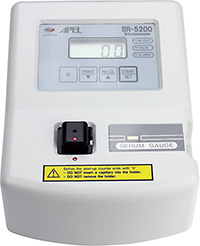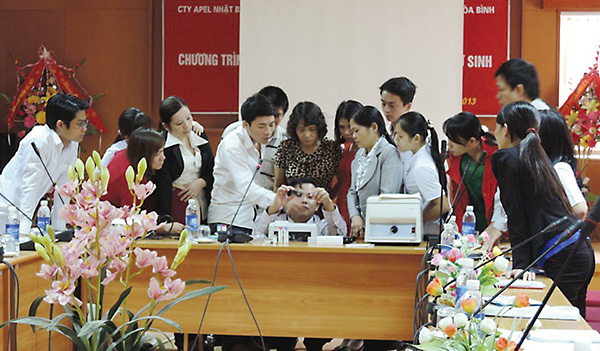Master Techniques, From Japan to the World - 1
A Japanese SME's attempt to save infants in a developing country
– Improving the diagnosis level of neonatal jaundice in Viet Nam

An instrument for measuring bilirubin level in blood. It is compact and lightweight. (Photo: APEL Co., Ltd.)
Neonatal jaundice is a medical condition that often appears right after birth, making the skin and sclerae of the baby appear yellow. While these symptoms are just physiological for most infants, in some cases, the baby may have pathological jaundice, which can lead to further symptoms later on. For this reason, precise diagnoses are important. However, in order to diagnose jaundice, doctors must measure the blood levels of a substance known as bilirubin. The high cost of the devices needed to diagnose jaundice means that in many developing countries, only a limited number of medical institutions are able to make an appropriate diagnosis.
One such case is Viet Nam. Although the quality of the country's health and medical care has risen greatly and the infant mortality rate (IMR) has fallen in recent years, most clinics in rural areas and agricultural communities do not have the necessary equipment to diagnose jaundice. For this reason, patients tend to gather at large hospitals in cities, placing a great burden on urban hospitals.
APEL Co., Ltd., which is located in Kawaguchi City, Saitama Prefecture, manufactures and sells medical equipment primarily for use in developing countries. It has already sold its products to clinics in 26 countries. The company developed its own specialized device for the diagnosis of newborn jaundice and began to consider whether it might be used to improve health and medical care in Viet Nam.
APEL Executive Vice-President Mr. Mitsuru Kashiwada explained, “The key characteristic of this device is that it can measure bilirubin by only using a small amount of blood. Therefore, it reduces the burden placed on newborns to the lowest extent possible. Although there are other manufacturers in China, the Republic of Korea and other countries which manufacture and sell such measurement devices, our product is appreciated for its high quality, befitting a Japanese manufacturer, since its results are reliable, it is easy to use, available at a low cost and rarely breaks down.” In order to manufacture products more cheaply and with higher quality, the company began to look for an opportunity to build a factory in Viet Nam to establish a production base in the country. The company then learned about MOFA and JICA's Support for Japanese Small and Medium Enterprise (SMEs) Overseas Business Development,1 and applied to one of its schemes (MOFA's Project Formulation Survey FY20132). APEL's project through MOFA, the test operation of company's products to diagnose jaundice, was initiated in two national and six locally-run hospitals with the cooperation of the Ministry of Health and Hoa Binh Provincial Health Bureau.
Mr. Kashiwada explained that the test operation was a great success, “After one month of test operation, people were highly impressed by the fact that there was little difference between what our small and light devices were capable of, and what conventional bulky machines were doing. The devices' capacity to diagnose patients with just a small amount of blood, therefore with less stress on newborn babies, was also highly appreciated. In the national pediatric hospital, people said that both testing and measurement were expected to improve after introducing this device to the hospital's emergency and neonatal intensive care units. In addition, if hospitals in rural and agricultural areas could measure bilirubin levels, it would help alleviate the concentration of patients at large hospitals and reduce the resulting workload in those hospitals. This project allowed us to meet with the directors of national hospitals, which is something that would have been difficult to do otherwise for an SME. I think that such an aspect is also one of the benefits for an SME to take part in a MOFA/JICA-sponsored scheme.”
However, new challenges emerged through the course of the trial operation. While the small size of the device was generally appreciated, it was pointed out that the centrifuge required to test the blood sample was relatively heavy, and that it was difficult for a doctor to carry the equipment when making a house call. APEL will take the feedback from the medical institutions that took part in the test operation into account in its future product development efforts.
Improving the quality of newborn medical care is currently one of the issues being actively tackled by the Government of Viet Nam. The fact that APEL's product received a favorable review from medical institutions during the test was of course a positive step forward. However, Mr. Kashiwada cautioned that it was not enough to simply promote the use of the device.
“What I realized through this project was, although it is important to promote the use of this device among hospitals, doctors, and medical care staff, it is equally important to educate the patients' families, particularly mothers, and promote the use of the device among them. The custom in Viet Nam is that the mother should leave the hospital one day after giving birth, and rest at home with her baby in a darkened room. In some cases, this delays the discovery of jaundice and causes the infant's condition to worsen. I hope that we will see gradual improvements on this point by communicating correct knowledge and information about it. As a manufacturer of medical devices trying to promote a business in a developing country, we realized that we must think about how we can deal with the country's issues, and how we can assist with solutions to those issues using our own knowledge. I hope that the number of serious cases of neonatal jaundice in Viet Nam will fall to the same level as Japan and other developed countries. We will continue to do all we can to contribute to that.”
*1 Projects that work to both develop a developing country and stimulate the Japanese economy through promoting the use of the advanced products and technologies of SMEs for the development of developing countries.
*2 A survey into the feasibility of using a certain product or technology for the development of a developing country based on a proposal submitted by an SME.

Training on how to use equipment was held in a hospital in Hoa Binh Province. (Photo: APEL Co., Ltd.)
Next Page >>
Main Text | Statictics and Reference Materials | Stories from the field | Master Techniques, From Japan to the World - | ODA Topics
